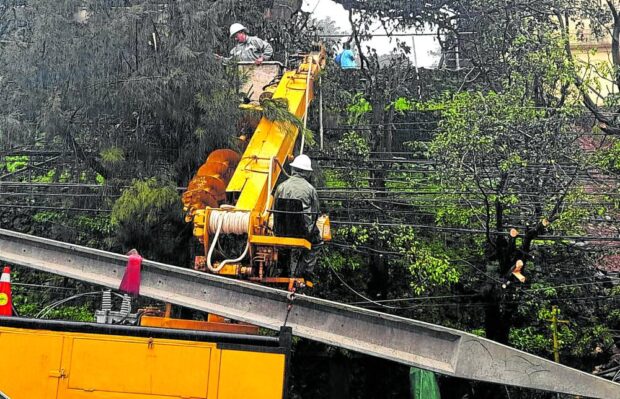
SERVICE IMPROVEMENT | The utility that keeps the lights on in Baguio City and Benguet province has negotiated a deal that may temper a power rate hike. The Benguet Electric Cooperative signed a compromise agreement last week with its power supplier on a petition for a rate hike. (Photo by ALLAN MACATUNO / Inquirer Northern Luzon)
BAGUIO CITY, Benguet, Philippines — A potential electricity rate hike in Baguio City and Benguet province due to unstable coal prices has been cushioned by a new deal between their utility and its power supplier, officials said on Wednesday.
The Benguet Electric Cooperative (Beneco) and Team Energy, which operates the 1,200-megawatt Sual coal-fired plant in Pangasinan province, have successfully negotiated a compromise fee adjustment which they sent last week to the Energy Regulatory Commission (ERC) for its approval, acting Beneco general manager Delmar Cariño said.
Cariño said Beneco still needed to determine how much households and businesses would need to shoulder should ERC approve the deal, but power bill adjustments should be lower than what Team Energy earlier proposed.
Team Energy’s subsidiary, Team Sual Corp. (TSC), applied for a power generation rate increase with ERC in September last year.
Beneco opposed TSC’s petition, arguing that its consumers would end up paying more, according to Beneco’s July 19 letter to Vice Mayor Faustino Olowan.
On July 10 and on July 24, the city council conducted an inquiry into the anticipated rate hike after Beneco advised its member-consumers in June to prepare for a billing spike of as much as P1.50 per kilowatt hour. Households are currently charged P10.44 for every kWh consumed.
Special mechanism
Beneco consumers, including big businesses like shopping malls, have been benefiting from the utility’s 2016 letter of Aareement (LOA) with Team Energy.
The LOA’s special power supply mechanism fixed electricity supply rates at P3.85 per kWh provided global coal prices remained at a threshold between $66 (P3,743) and $125 (P7,090) per metric ton.
The COVID-19 pandemic and the Russian invasion of Ukraine “changed the landscape,” and coal prices at one point soared to as much as $450 (P25,523) per MT, Beneco told Olowan in the July letter.
TSC informed Beneco it could no longer afford to maintain that selling price.
But the Sual plant operator had agreed to continue charging an interim rate of P4.95 per kWh, and a subsequent temporary rate of P5.73 per kWh, while TSC and Beneco negotiated a new coal price cap, according to the Beneco letter.
When talks failed, TSC applied for a rate hike and billed Beneco P2.3 billion in February, the letter noted.
The new agreement enforces a coal price cap of $123.39 (P6,999) per MT for the 2023 billing period from March 2022 to February this year; and $112.17 (P6,362) per MT covering June 2023 to May 2024, when their supply agreement lapses. The deal would bring down Beneco’s obligation from over P2 billion to P684 million for electricity purchased from Sual.
‘Premature’
Former Beneco board president Esteban Somngi appeared in the council inquiry on July 24 to protest the TSC negotiation, asserting that it was “premature.”
But Cariño said the utility decided to proceed with talks to settle the dispute and control the outcome.
Businessman Steve Cating, president of Beneco’s interim board of directors, said resolving Beneco’s financial issues would help speed up the renewal of the utility’s franchise that is pending in Congress. Beneco’s franchise will expire in 2028.
Also pending before the ERC is another fee dispute over universal charges that are collected by the Power Sector Assets and Liabilities Management Corp. (PSALM), which may also require Beneco to adjust household bills.
PSALM was created by the 2001 Electric Power Industry Reform Act, or Epira, (Republic Act No. 9136) to manage the sale and debts of the National Power Corp., and to collect and administer universal charges (or the recovery of the power sector’s stranded debts), which every Filipino household still pays.
Beneco and other electric cooperatives are required by Epira to collect the monthly incremental currency Exchange rate adjustment covering 2018 to December 2022 to recover the “incremental costs of fuel and power sourced from independent power producers,” Beneco told the council.
The power cooperative is also supposed to collect from consumers the monthly generation rate adjustment mechanism which “represents the cost effects of fluctuations in the international currency exchange rates” on debt services, operations, insurance and spare parts.
Beneco is negotiating a debt restructuring agreement with PSALM to pay P300 million.